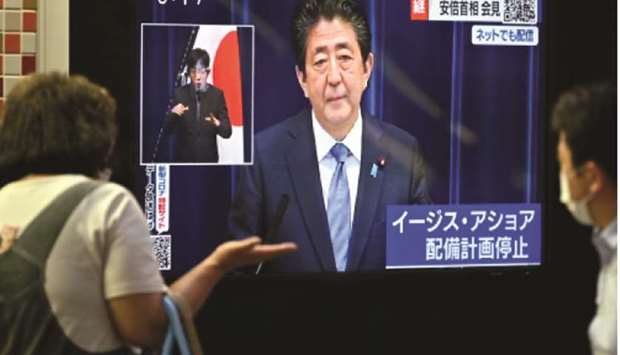A former Japanese justice minister and his lawmaker wife were arrested yesterday on suspicion of vote-buying, prosecutors said, in a serious blow to Prime Minister Shinzo Abe as he struggles with falling public support.
Support for Abe, who had close ties to the ex-minister, has declined over dissatisfaction with his handling of the coronavirus crisis, his attempt to extend top prosecutors’ retirement age, and suspicions of wasteful public spending in programmes to support for tourism and small companies.
Tokyo prosecutors said in a statement that Katsuyuki Kawai and his wife Anri paid 1.7mn yen ($15,900) to five people last year to get her a seat in the 2019 upper house election. Separately, Katsuyuki Kawai gave about 24mn yen to 91 people to secure her election, the statement said, without identifying them. Katsuyuki Kawai on Wednesday denied wrongdoing while Anri Kawai declined comment on the advice of her lawyer. Abe apologised to the public over the arrests.
“It is regrettable that lawmakers from our party were arrested and I feel strongly my responsibility for the appointment of the past justice minister,” he told a news conference.
Anri Kawai’s campaign had received a 150mn yen contribution from ruling Liberal Democratic Party (LDP) headquarters, raising eyebrows because of its size.
Asked whether part of the money could have been used to buy votes, Abe referred to comments by the party’s secretary general that certified public accountants made strict retroactive checks on each party branch’s expenses ruling out such misuse.
Katsuyuki Kawai, who previously served as a foreign policy adviser to Abe, quit as minister last October after reports of election irregularities by his wife.
“I have never engaged in political activities that are shameful in the light of my conscience, nor against the law,” Kyodo news agency quoted him as saying on Wednesday.
Anri has also rejected the allegations, media reports said. Reuters could not reach either yesterday.
Lawmakers cannot be arrested while parliament is in session. The latest session ended on Wednesday. Abe returned to office in December 2012 and last November became Japan’s longest serving prime minister.
His term as ruling LDP leader, and hence premier, ends in September 2021 but there is speculation he may have to step down sooner given sagging support, which fell below 30% in two polls last month.
Political sources and experts said Abe would be weakened but was unlikely to step down immediately as Japan contends with the pandemic.
“The damage will be quite big,” said University of Tokyo political science professor Yu Uchiyama. “He will be a lame duck.”
Abe told the news conference he was not considering calling a snap election but would not hesitate to do so if needed.
The prime minister is struggling to ease the impact of the coronavirus on the world’s third-largest economy.
He has launched two stimulus packages totalling $2.2tn but over half of the respondents to a Reuters survey were critical of the response.

Pedestrians walk past as a television screen showing a broadcast of Japanese Prime Minister Shinzo Abe speaking during a press conference in Tokyo yesterday.
